PROMISE PARK in Gwangju



Promise park_Gwangju, 20121. Promise Park in Gwangju, 2021, Woven carpet installation, 7600 x 7600 x 15(mm)
Displayed at the Biennale Hall, Kyungwon Moon’s new work, Promise Park (2021), is an extension of the artist’s project series of the same name, which explores the urban environment, relationships between human cognition, sociality and technology, and the historiographic becoming of humanity. The “park” is an abstract space to assess tumultuous episodes of Korea’s modern history and socio-economic development, from textile factories that were the site of Japanese exploitation in the 1950s to the foundation of modern industries in Gwangju and the South Jeolla in the 1960s. The industrial past has been erased by the development of large residential complexes and a historical park surrounding the region’s waterways and mountain paths. Tracing the transformation of the urban landscape across old maps of Gwangju city, Moon teases out a pattern of invisible traces of time and weaves different stories into a cohesive narrative, rendering Promise Park—a public garden where viewers can experience shared temporality and space in its entirety—into a gathering site for communal empathy and solidarity.
Moon recognizes the gap between visual production of an idealised world as constructed through human and scientific fantasy and the complex operations of social intelligence across lived reality. Since 2015, she has adapted Promise Park to different contexts as a pivotal model of inquiry. For the Gwangju Biennale, the artist collaborates with cognitive scientists, architects, regional cultural researchers, scholars of Chinese horoscope, and other specialists to explore transformations of the built landscape, social practices, and neurocognition. Free to access in Gallery 1, Promise Park provides a platform for the social exchange of intergenerational perspectives while taking into account Gwangju’s traumatic past and ongoing solidarity alliances.